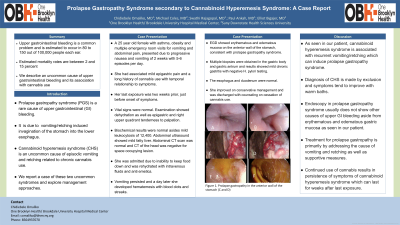Sunday Poster Session
Category: Stomach
P1418 - Prolapse Gastropathy Syndrome Secondary to Cannabinoid Hyperemesis Syndrome: A Case Report
Sunday, October 22, 2023
3:30 PM - 7:00 PM PT
Location: Exhibit Hall

Has Audio

Chidiebele E. Omaliko, MD
One Brooklyn Health-Brookdale University Hospital Medical Center
Brooklyn, NY
Presenting Author(s)
Chidiebele Omaliko, MD1, Michael Coles, MD2, Swathi Rajagopal, MD1, Paul Ankah, MD1, Elliot Bigajer, MD1
1One Brooklyn Health-Brookdale University Hospital Medical Center, Brooklyn, NY; 2SUNY Downstate Health Sciences University, Brooklyn, NY
Introduction: Prolapse gastropathy syndrome (PGS) is a rare cause of upper gastrointestinal (GI) bleeding, and is due to vomiting/retching induced invagination of the stomach into the lower esophagus. Cannabinoid hyperemesis syndrome (CHS) is an uncommon cause of episodic vomiting and retching related to chronic cannabis use. We report a case of these two uncommon syndromes and explore management approaches.
Case Description/Methods: A 25 year old female with asthma, obesity and multiple emergency room visits for vomiting and abdominal pain, presented due to progressive nausea and vomiting of 2 weeks with 5-6 episodes per day. She had associated mild epigastric pain and a long history of cannabis use with temporal relationship to symptoms. Her last exposure was two weeks prior, just before onset of symptoms. Vital signs were normal. Examination showed dehydration as well as epigastric and right upper quadrant tenderness to palpation. Biochemical results were normal asides mild leukocytosis of 12,400. Abdominal ultrasound showed mild fatty liver. Abdominal CT scan was normal and CT of the head was negative for space occupying lesion. She was admitted due to inability to keep food down and was rehydrated with intravenous fluids and anti emetics. Vomiting persisted and a day later she developed hematemesis with blood clots and streaks. EGD showed erythematous and edematous mucosa on the anterior wall of the stomach, consistent with prolapse gastropathy syndrome. Multiple biopsies were obtained from the gastric body and antrum and results showed mild chronic gastritis with negative Helicobacter pylori testing. The esophagus and duodenum were normal. She improved on conservative management and was discharged with counseling on cessation of cannabis use.
Discussion: As seen in our patient, cannabinoid hyperemesis syndrome is associated with recurrent vomiting/retching which can induce prolapse gastropathy syndrome. Diagnosis of CHS is made by exclusion and symptoms tend to improve with warm baths. Endoscopy in prolapse gastropathy syndrome usually does not show other causes of upper GI bleeding aside from erythematous and edematous gastric mucosa as seen in our patient. Treatment for prolapse gastropathy is primarily by addressing the cause of vomiting and retching as well as supportive measures. Continued use of cannabis results in persistence of symptoms of cannabinoid hyperemesis syndrome which can last for weeks after last exposure.

Disclosures:
Chidiebele Omaliko, MD1, Michael Coles, MD2, Swathi Rajagopal, MD1, Paul Ankah, MD1, Elliot Bigajer, MD1. P1418 - Prolapse Gastropathy Syndrome Secondary to Cannabinoid Hyperemesis Syndrome: A Case Report, ACG 2023 Annual Scientific Meeting Abstracts. Vancouver, BC, Canada: American College of Gastroenterology.
1One Brooklyn Health-Brookdale University Hospital Medical Center, Brooklyn, NY; 2SUNY Downstate Health Sciences University, Brooklyn, NY
Introduction: Prolapse gastropathy syndrome (PGS) is a rare cause of upper gastrointestinal (GI) bleeding, and is due to vomiting/retching induced invagination of the stomach into the lower esophagus. Cannabinoid hyperemesis syndrome (CHS) is an uncommon cause of episodic vomiting and retching related to chronic cannabis use. We report a case of these two uncommon syndromes and explore management approaches.
Case Description/Methods: A 25 year old female with asthma, obesity and multiple emergency room visits for vomiting and abdominal pain, presented due to progressive nausea and vomiting of 2 weeks with 5-6 episodes per day. She had associated mild epigastric pain and a long history of cannabis use with temporal relationship to symptoms. Her last exposure was two weeks prior, just before onset of symptoms. Vital signs were normal. Examination showed dehydration as well as epigastric and right upper quadrant tenderness to palpation. Biochemical results were normal asides mild leukocytosis of 12,400. Abdominal ultrasound showed mild fatty liver. Abdominal CT scan was normal and CT of the head was negative for space occupying lesion. She was admitted due to inability to keep food down and was rehydrated with intravenous fluids and anti emetics. Vomiting persisted and a day later she developed hematemesis with blood clots and streaks. EGD showed erythematous and edematous mucosa on the anterior wall of the stomach, consistent with prolapse gastropathy syndrome. Multiple biopsies were obtained from the gastric body and antrum and results showed mild chronic gastritis with negative Helicobacter pylori testing. The esophagus and duodenum were normal. She improved on conservative management and was discharged with counseling on cessation of cannabis use.
Discussion: As seen in our patient, cannabinoid hyperemesis syndrome is associated with recurrent vomiting/retching which can induce prolapse gastropathy syndrome. Diagnosis of CHS is made by exclusion and symptoms tend to improve with warm baths. Endoscopy in prolapse gastropathy syndrome usually does not show other causes of upper GI bleeding aside from erythematous and edematous gastric mucosa as seen in our patient. Treatment for prolapse gastropathy is primarily by addressing the cause of vomiting and retching as well as supportive measures. Continued use of cannabis results in persistence of symptoms of cannabinoid hyperemesis syndrome which can last for weeks after last exposure.

Figure: Endoscopy Image showing Prolapse Gastropathy Syndrome as Depicted in figures E and F.
Disclosures:
Chidiebele Omaliko indicated no relevant financial relationships.
Michael Coles indicated no relevant financial relationships.
Swathi Rajagopal indicated no relevant financial relationships.
Paul Ankah indicated no relevant financial relationships.
Elliot Bigajer indicated no relevant financial relationships.
Chidiebele Omaliko, MD1, Michael Coles, MD2, Swathi Rajagopal, MD1, Paul Ankah, MD1, Elliot Bigajer, MD1. P1418 - Prolapse Gastropathy Syndrome Secondary to Cannabinoid Hyperemesis Syndrome: A Case Report, ACG 2023 Annual Scientific Meeting Abstracts. Vancouver, BC, Canada: American College of Gastroenterology.

